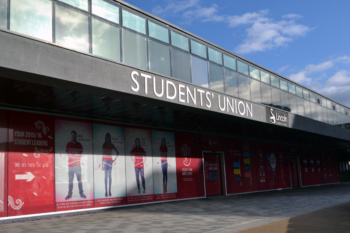The University of Lincoln’s Students’ Union has issued a second statement defending its rejection of a motion on free speech, after an open letter called for a ‘full explanation’ behind the decision.

In an email obtained by The Linc, SU President Kudzai Muzangaza said: “After seeking legal advice on the matter, the Board [of Trustees] acknowledged that there are set circumstances in which restrictions on free expression can be enforced, namely with the purpose of “protecting the rights of others”.
The news comes after student members voted through a policy on free speech at an All Student Members meeting (ASM) in March. The motion, submitted by Joshua Grinsell, called the temporary ban on the Conservative Society’s social media as being ‘misguided’ and ‘an unacceptable breach on freedom of expression’.
Since March, all three policies passed at the meeting – including votes on the organisation’s disciplinary policy and boycotting the National Student Survey – have been rejected or ‘nullified’ by the union.
The new statement, from the SU’s President Kudzai Muzangaza, said:
Firstly, I would like to start by giving a little context to the role and responsibilities of the Trustees in the Union. This is by no means intended to patronise, but instead it is give an idea of the perspective the Trustees take when considering the governance and direction of the Union.
The Union’s Articles of Association lay out the responsibilities held by the Trustees. They are responsible for the management of the Union, including (but not limited to) aspects such as the governance, budget, and strategic aims. Legal advice, commissioned by the National Union of Students states that the Trustees must make “balanced and informed decisions” which, in their discretion, must be in the best interests of the Union since they are under a legal duty to do so.
If we consider the first point raised in the open letter, the Board welcomes calls to review the effectiveness of policies and procedures in place. However, the Disciplinary Reform motion was rejected on the grounds that the resourcing implication for the Union would have been too great to implement. Specifically, this is referring to the proposals put forward in the first resolve.
Another issue of contention is the fact that the Disciplinary Policy is a statutory Board policy rather than a student one. Therefore, whilst student input in the policy is encouraged, the Board must be comfortable with the procedural aspect of the policy as it is part of a Union wide Complaints Process which, in addition, is part of the Code of Conduct
The review of the Disciplinary Procedures is currently underway. The Board has delegated the responsibility of the review to the Chief Executive of the Union. The review will be presented to the Executive, which includes all the elected Sabbatical Officers, who will approve and/or recommend changes prior to presentation to the Board. The Board will then approve the recommendations from the Union Executive. In essence, student input is considered in the process through the elected Sabbatical Officers.
In reference to the Freedom of Speech motion, after seeking legal advice on the matter, the Board acknowledged that there are set circumstances in which restrictions on free expression can be enforced, namely with the purpose of “protecting the rights of others”.
Resolutions proposed in the Freedom of Speech motion would have contradicted with established policy, for example “the Disciplinary Panel should not impose bans on Societies and Sports Teams using Social Media unless and until this is included in their powers under the Disciplinary Procedures”. The Disciplinary Procedures already states that:
5.5 In dealing with the complaint, the Disciplinary Panel may:
5.5.2 Suspend the rights and privileges of a member, including the right to hold any position of responsibility…and…using all ULSU services and partaking in Union activities (including Society/Sports Clubs events).
Since Social Media accounts linked to Societies and Sports teams are inherently linked to the Union, it is at the discretion of the panel to enforce such sanctions. And as aforementioned, the Disciplinary Procedure is a statutory policy which the Board has to be comfortable with in terms of the procedural element in which powers are delegated to the Disciplinary Panel.
I would like to note that whilst there was clear frustration over the course of the previous academic year, the Board has put in safeguards to ensure that the student body is aware of the processes laid out in how the Union is run. This includes better Sabbatical Officer training as well as an increased focus on Sabbatical engagement with the student body. As the Chair of the Board, I am very keen to ensure the student voice is heard and that the membership is empowered and reassured that the Board of Trustees ultimately has the best interest of the Union at heart.
This year’s Sabbatical Officer team intends on ensuring that sufficient feedback is relayed back to students and that students feel comfortable voicing their concerns with the officer team. We expect students to be holding us to account if they feel that they are not being represented. Because of this, I feel we are in a better position to be able to enact positive change.
This is the second quote to be issued by the Students’ Union defending the decision, after an article on their website in May said they are ‘keen to ensure’ the right to freedom of expression is upheld, but it is an unqualified right.
“Student engagement with the Union is welcomed,” they went on to add. “In order though to promote the interests and welfare of students (one of the objects of the Union charity), the Union needs the ability to regulate use of social media and other platforms at the University in order to protect the wider student body from discrimination and abuse.
“Freedom of speech’ does not override this duty on the Trustees,” they said.

